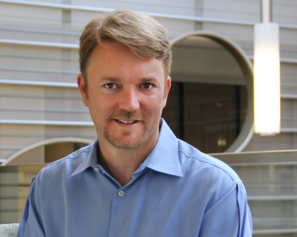
- This event has passed.
ESE Fall Colloquium – “Phase Transitions, Symmetry, and Reed-Muller Codes on BMS Channels”
November 10, 2022 at 12:30 PM - 1:30 PM
This talk will begin by discussing phase transitions in high-dimensional statistical inference problems. Some effort will be made to distinguish between problems with random structure (e.g., random codes and sparse PCA) and problems with deterministic structure (e.g., highly symmetric codes such as Reed-Muller codes). For problems with deterministic structure, we will observe that symmetry can sometimes play a key role in characterizing their phase transitions. In particular, I will describe my recent work with Galen Reeves that proves Reed-Muller (RM) codes achieve capacity on binary memoryless symmetric (BMS) channels with respect to bit-error rate. This result resolves a long-standing open problem that connects information theory and error-correcting codes. Our approach generalizes some elements of an earlier proof for the binary erasure channel but also derives new tools to avoid previous steps that do not generalize. The new idea is to combine a nesting property of RM codes with new information inequalities relating the derivative of the conditional entropy (as a function of the channel parameter) with minimum mean-squared error estimation.

Henry D. Pfister
Professor, Electrical and Computer Engineering at Duke University with a Secondary Appointment in Mathematics
Henry D. Pfister received his Ph.D. in Electrical Engineering in 2003 from the University of California, San Diego and is currently a professor in the Electrical and Computer Engineering Department of Duke University with a secondary appointment in Mathematics. Prior to that, he was an associate professor at Texas A&M University (2006-2014), a post-doctoral fellow at the École Polytechnique Fédérale de Lausanne (2005-2006), and a senior engineer at Qualcomm Corporate R&D in San Diego (2003-2004). His current research interests include information theory, error-correcting codes, quantum computing, and machine learning.
He received the NSF Career Award in 2008 and a Texas A&M ECE Department Outstanding Professor Award in 2010. He is a coauthor of the 2007 IEEE COMSOC best paper in Signal Processing and Coding for Data Storage, a coauthor of a 2016 Symposium on the Theory of Computing (STOC) best paper, and a recipient of the 2021 Information Theory Society Paper Award. He has served the IEEE Information Theory Society as a member of the Board of Governors (2019-2022), an Associate Editor for the IEEE Transactions on Information Theory (2013-2016), and a Distinguished Lecturer (2015-2016). He was the General Chair of the 2016 North American School of Information Theory and a Technical Program Committee Co-Chair of the 2021 International Symposium on Information Theory.
